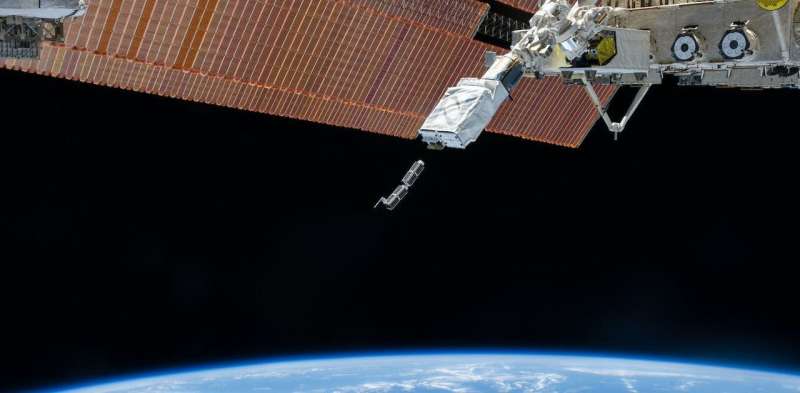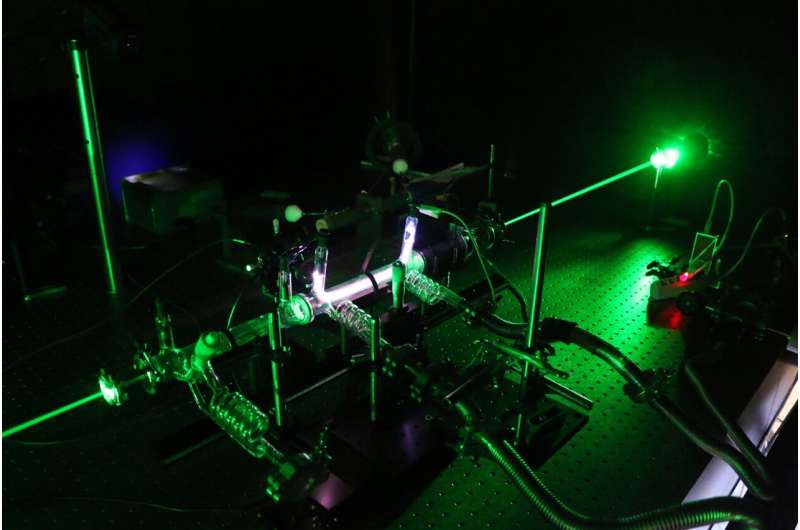
Copernical Team
War in Ukraine highlights the growing strategic importance of private satellite companies

Satellites owned by private companies have played an unexpectedly important role in the war in Ukraine. For example, in early August 2022, images from the private satellite company Planet Labs showed that a recent attack on a Russian military base in Crimea caused more damage than Russia had suggested in public reports. Ukrainian President Volodymyr Zelenskyy highlighted the losses as evidence of Ukraine's progress in the war.
Soon after the war began, Ukraine requested data from private satellite companies around the world. By the end of April, Ukraine was getting imagery from U.S. companies mere minutes after the data was collected.
My research focuses on international cooperation in satellite Earth observations, including the role of the private sector.
Harvesting resources on Mars with plasmas

An international team of researchers came up with a plasma-based way to produce and separate oxygen within the Martian environment. It's a complementary approach to NASA's Mars Oxygen In-Situ Resource Utilization Experiment, and it may deliver high rates of molecule production per kilogram of instrumentation sent to space.
Such a system could play a critical role in the development of life-support systems on Mars and the feedstock and base chemicals necessary for processing fuels, building materials, and fertilizers.
In the Journal of Applied Physics, the team from the University of Lisbon, the Massachusetts Institute of Technology, Sorbonne University, Eindhoven University of Technology, and the Dutch Institute for Fundamental Energy Research presented a method for harnessing and processing local resources to generate products on Mars.
Kayhan Space unveils next-gen spaceflight safety platform
 With thousands of satellites and countless debris bound for busy orbits, Kayhan Space has unveiled its next-gen Pathfinder spaceflight safety platform to enable satellite and mission operators to better manage operational risks and make preemptive maneuvers based on precision analytics to avoid pileups in space.
Capella Space, Globalstar, and Lynk Global are among an initial group of leadi
With thousands of satellites and countless debris bound for busy orbits, Kayhan Space has unveiled its next-gen Pathfinder spaceflight safety platform to enable satellite and mission operators to better manage operational risks and make preemptive maneuvers based on precision analytics to avoid pileups in space.
Capella Space, Globalstar, and Lynk Global are among an initial group of leadi Space mission shows Earth's water may be from asteroids
 Water may have been brought to Earth by asteroids from the outer edges of the solar system, scientists said after analysing rare samples collected on a six-year Japanese space mission.
In a quest to shed light on the origins of life and the formation of the universe, researchers are scrutinising material brought back to earth in 2020 from the asteroid Ryugu.
The 5.4 grams (0.2 ounces) of
Water may have been brought to Earth by asteroids from the outer edges of the solar system, scientists said after analysing rare samples collected on a six-year Japanese space mission.
In a quest to shed light on the origins of life and the formation of the universe, researchers are scrutinising material brought back to earth in 2020 from the asteroid Ryugu.
The 5.4 grams (0.2 ounces) of NASA moves up launch of massive moon rocket
 NASA announced Monday that it will roll out its Artemis I Moon rocket on Tuesday evening, which is two days earlier than originally planned.
Tuesday's planned roll out represents the final prelaunch test before the scheduled launch on Aug. 29. The uncrewed test flight will remain in space for 42 days before returning to Earth.
Rick LaBrode, the lead flight director for Artemis I,
NASA announced Monday that it will roll out its Artemis I Moon rocket on Tuesday evening, which is two days earlier than originally planned.
Tuesday's planned roll out represents the final prelaunch test before the scheduled launch on Aug. 29. The uncrewed test flight will remain in space for 42 days before returning to Earth.
Rick LaBrode, the lead flight director for Artemis I, The new generation of Starlink satellites remain above the accepted brightness threshold

It's one of the stranger sights of the modern Space Age. Recently, we found ourselves under the relatively dark skies of southern Spain. Sure enough, within a few minutes, we caught sight of a chain of flashing "stars" winking in and out of view in quick succession.
Starlink trains are now a familiar sight, the boon and bane of the modern era. While SpaceX's mega-satellite promises to become a true disruptor in the worldwide internet game, it also has the potential to add to the burden of light pollution in the night sky. Will there soon come a time in the not-too-distant future when moving artificial "stars" outnumber real ones?
The rise of Starlink
The problem for astronomers didn't really become apparent until the first launch of 60 Starlink satellites in May 2019. To date, SpaceX has launched Starlink batches at a breakneck pace, with over 2,900 total deployed and 2,286 still in orbit and in service as of early August 2022.
Matter at extreme temperature and pressure turns out to be remarkably simple and universal
 Scientists at Queen Mary University of London have made two discoveries about the behaviour of 'supercritical matter' - matter at the critical point where the differences between liquids and gases seemingly disappear.
Previously, while the behaviour of matter at reasonably low temperature and pressure was well understood, the picture of matter at high temperature and pressure was blurred.
Scientists at Queen Mary University of London have made two discoveries about the behaviour of 'supercritical matter' - matter at the critical point where the differences between liquids and gases seemingly disappear.
Previously, while the behaviour of matter at reasonably low temperature and pressure was well understood, the picture of matter at high temperature and pressure was blurred. A step towards quantum gravity
 In Einstein's theory of general relativity, gravity arises when a massive object distorts the fabric of spacetime the way a ball sinks into a piece of stretched cloth. Solving Einstein's equations by using quantities that apply across all space and time coordinates could enable physicists to eventually find their 'white whale': a quantum theory of gravity.
In a new article in EPJ Historica
In Einstein's theory of general relativity, gravity arises when a massive object distorts the fabric of spacetime the way a ball sinks into a piece of stretched cloth. Solving Einstein's equations by using quantities that apply across all space and time coordinates could enable physicists to eventually find their 'white whale': a quantum theory of gravity.
In a new article in EPJ Historica Pitt is the only university in the U.S. with this giant 3D printer for metal
 Tucked away in the sub-basement of Pitt's Benedum Hall, past the racecar parts spilling into hallways, you'll find a giant machine that looks like a cross between a car garage and the entry port of a sci-fi spaceship. It's a state-of-the-art 3D printer for metal - the first Gefertec arc605 at any university in the U.S.
For producing big, specialized metal parts, the machine is unbeatable,
Tucked away in the sub-basement of Pitt's Benedum Hall, past the racecar parts spilling into hallways, you'll find a giant machine that looks like a cross between a car garage and the entry port of a sci-fi spaceship. It's a state-of-the-art 3D printer for metal - the first Gefertec arc605 at any university in the U.S.
For producing big, specialized metal parts, the machine is unbeatable, Iran seeks 3 more Khayyam satellites
 Iran plans to commission three more versions of a satellite launched this week by Russia, Tehran's government spokesman said Friday.
The Khayyam blasted into orbit on Tuesday, prompting US accusations that it is intended for spying. Iran dismissed Washington's claim as "childish."
"The construction of three other Khayyam satellites with the participation of Iranian scientists is on the g
Iran plans to commission three more versions of a satellite launched this week by Russia, Tehran's government spokesman said Friday.
The Khayyam blasted into orbit on Tuesday, prompting US accusations that it is intended for spying. Iran dismissed Washington's claim as "childish."
"The construction of three other Khayyam satellites with the participation of Iranian scientists is on the g 